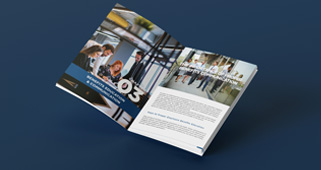Technology is one of the fastest growing industries worldwide – a fact that comes as a shock to no one. The industry is on pace to exceed $5.3 trillion in 2022. 2020 did little to slow the climb long-term, as the industry is projected to return to its previous pattern of 5 percent to 6 percent growth year over year. Human resources professionals are often challenged to keep up with high growth rates, and they face unique challenges specific to the trade.
Below, the Human Resources experts at Benely identify some of the top HR challenges the tech industry faces today, and what your organization can do about them.
1. The Challenge: Recruiting Top Talent
According to 2021 research by Bain & Company, job postings calling for technology-based skills have skyrocketed year over year during the last decade. For example, postings including “software engineering” have increased 69 percent from 2015 to 2019, with postings for “machine learning” increasing 417 percent, for “data science” increasing 167 percent, and postings for “DevOps” increasing 443 percent in the same time span.
When growth is this high, the lurch leads to a gap between supply and demand. In turn, the market gap between supply and demand means the competition for recruiting top talent is fierce. According to research on the subject conducted by Indeed, job seeker interest in software architect job postings meets only 29.4 percent of the employer demand, and DevOps job postings meet only 39.6 percent.
Indeed’s findings iterate that companies desperate to achieve their hiring goals are often relegated to second, third, and fourth choices of hires. Half of the companies surveyed have hired tech talent despite candidates not meeting the job description requirements.
The Solution: Standing Out for Good
When Google, Apple, and Microsoft are all increasing their tech hiring, what can small and mid-sized firms do to stay competitive? When the obvious answers (high salaries, great benefits, flexible work options) fail, organizations have to dig deeper and get creative. Playing up your unique mission and purpose as a company will allow you to even the playing field here.
Research from PwC shows that Millennials are looking for more in life than “just a job”. They want to do something that feels worthwhile, they take into account the values of a company when considering a job, and they are motivated by much more than money. This is confirmed by LinkedIn’s latest Workplace Culture report, which found that 86 percent of millennials between ages 22 and 37 would consider taking a pay cut to join a company whose mission and values they agree with.
This may come as a shock to seasoned human resources professionals, as only 9 percent of the baby boomer generation, or employees between the ages of 54 and 72, would do the same according to the report. The report notes that nearly 90 percent of employees think it matters that they’re able to be proud of the company they work for. So if you’re looking for a new recruitment angle, amplifying your company’s altruistic qualities is a future-facing place to start.
2. The Challenge: The Ever-Changing Face of Demand
According to Dheeraj Jain of Redcliffe Life Diagnostics, “The problem with Tech hiring is that everyone wants to hire the same Top 5% talent, while the majority of 95% IT employees continue to be grossly underpaid due to absolute lack of quality training and skills.” Jain brings up an excellent point, highlighting a key challenge faced by the HR departments of technology firms.
Software systems, coding languages, and skills taught in universities can go out of date, or be rendered less useful, in just a few years – if not a matter of months. With turnover as high as it is in the technology industry, HR representatives need a creative way to make the most of what they have, without having to turn to the fight for the next best thing.
The Solution: Investments in Employee Development
Investing in the education of the employees you have is the key to solving the next-best-thing dilemma. While HR departments won’t know the answer to what kind of training current tech employees will need to meet the business’ upcoming demands, it’s likely that tech managers will know where to start. Trust their advice and remember that if the commitment to an investment in employee learning and development is there, you’re on the right track.
3. The Challenge: Hiring and Training for Soft Skills
According to a 2018 study, 43% of full-time employees reported that problems with soft skills negatively impacted their working relationship with IT. The study showed 71 percent of respondents indicated that issues with collaboration were responsible for delaying projects, and a third of respondents reported they had missed a deadline due to those communication errors.
It makes sense, then, that a lack of soft skills is what’s holding some tech professionals back from succeeding to their fullest potential at work. But despite the value of soft skills for professionals in any industry, many companies don’t do much to either screen for them at the hiring stage or remedy the problem through ongoing training.
The Solution: Centering Soft Skills During Recruitment and Employee Development
Screening for soft skills during the hiring process seems like an unnecessary, if not risky extra step in an already cut-throat recruiting market. But asking candidates simple behavioral-based questions can separate a candidate who can be trained in hard skills from one with great credentials, but an impossible fit culture-wise.
Consider integrating questions into your interviews that focus on how a candidate handled a previous mistake, worked with a member of another department to resolve an issue, or handled criticism from a manager in the past. Going forward, invest in training for managers on how to model great coworking behavior and deliver feedback.
4. The Challenge: Managing a Notoriously Tough Work-Life Balance
Tech-guru, CTO, and the co-founder of Basecamp, David Heinemeier Hanson, has written: “There’s an ingrained mythology around startups that not only celebrates burn-out efforts, but damn well requires it.” He’s not wrong, and research shows that nearly two-thirds (62 percent) of tech workers have reported that they would go so far as to quit their job for a better work-life balance.
As glamorous as the technology industry can seem, its dark side marks a distinct challenge for HR departments tasked with retaining the top talent the company vied for to begin with.
When this stark of a problem is ignored, burnout can result. In 2019, the World Health Organization (WHO) officially recognized workplace burn-out as a medical condition and a mental health issue. The WHO describes burn-out as “a syndrome . . . resulting from chronic workplace stress that has not been successfully managed.”
A study published by the European Journal of Preventative Cardiology found that when it’s not addressed, burnout can even lead to serious problems such as depression and heart disease.
The Solution: Provide Unique Options and Let the Employee Choose
There are many solutions that can help chip away at the problem of burn-out, including spotting the signs early, understanding the causes, encouraging breaks throughout the workday, and revamping your employee wellness initiatives. (For more information on preventing employee burnout, see our post on the topic).
Surveys might indicate options like flexible working schedules, vacation time, and remote working options outrank subsidized transportation, gym memberships, and on-site amenities. All in all, you can’t go wrong with being open to feedback and allowing employees to choose which options are right for them.
Overcome these Challenges and More: Partner with Benely’s HR Experts.
Even the most seasoned human resources team can use a hand from time to time. At Benely, we’re experts in all things human resources. Our signature HR audit will help you identify the effectiveness of your current HR department. Contact Benely to learn more, or request a demo.






